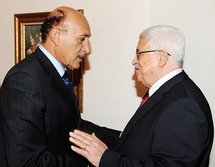Abbas visits Egypt for talks on Mideast peace
Samer al-Atrush
CAIRO, Samer al-Atrush - Palestinian president Mahmud Abbas arrived in Egypt on Sunday for talks aimed at relaunching peace talks with Israel, amid lingering divisions over Jewish settlement expansion.
Abbas met with Egypt's intelligence chief Omar Suleiman after jetting in to the Red Sea resort of Sharm el-Sheikh, where he is to hold talks with Egyptian President Hosni Mubarak on Monday before heading to Qatar, Kuwait and Turkey.

Omar Suleiman and Mahmud Abbas
The visit comes almost a week after Israeli Prime Minister Benjamin Netanyahu met in Cairo with Mubarak about the stalled peace process and as diplomats said Washington was drafting letters of guarantees for the peace talks.
An Arab diplomat told AFP last week that US special envoy George Mitchell would present the letters to Israel and the Palestinian Authority on his next visit to the region.
"The United States is hoping that the two letters will serve as a basis for the relaunch of Israeli-Palestinian negotiations but we don't know if they will satisfy the Palestinians, who want a complete freeze of settlement activity before talks resume," the diplomat said.
Egyptian Foreign Minister Ahmed Abul Gheit is also planning to visit Washington for talks with officials on January 7, and has said he will be accompanied by Cairo's intelligence chief Omar Suleiman.
US President Barack Obama has repeatedly called on the two sides to resume peace talks, but the Palestinians have demanded Israel first freeze all settlement activity and commit to a framework for the talks.
Egypt, Saudi Arabia and Turkey have all urged Israel to halt its settlement activity, while Saudi Foreign Minister Prince Saud al-Faisal hit out at the Jewish state on Saturday for acting like a "spoiled child."
Abbas' spokesman Abu Rudeina said: "There are Arab and international efforts to create the climate to support the return to negotiations with the Israeli side based on a complete halt to settlements."
He added the Palestinians would also require "specific guidelines" for the talks, including that the borders of a future Palestinian state encompass all of their land Israel occupied in 1967.
The Palestinians have insisted that mostly Arab east Jerusalem -- occupied by Israel in 1967 and later annexed in a move not recognised by the international community -- be the capital of their future state.
"The Israeli position that we have seen up until now is not encouraging and it will not be possible to return to the negotiations based on it," Abu Rudeina said.
Netanyahu in November imposed a 10-month halt on new construction of settlements in the occupied West Bank but excluded east Jerusalem, public buildings and housing units already under construction.
Abbas suspended peace talks with Israel after it entered a 22-day war with Hamas, the Islamist rulers of Gaza, that killed more than 1,300 Palestinians and left swathes of Gaza devastated. Thirteen Israelis were killed.
Hamas's takeover of Gaza in 2007, which shrank Abbas's powerbase to the West Bank, left a deep rift between Palestinians that have also hampered peace talks with Israel.
Egypt has already twice postponed the planned signing of a reconciliation agreement in Cairo because of deep divisions between Hamas and Abbas' Fatah supporters.
But exiled Hamas leader Khaled Meshaal said during a visit Sunday to Saudi Arabia that a reconciliation deal is "close."
------------------------------------------------------------------------------------------------